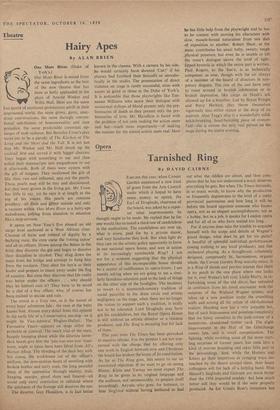Theatre
Hairy Apes
By ALAN BRIEN
One More River is mixed from the same ingredients as the best of the new theatre that has been so hotly applauded in the plays of Arnold Wesker and Willis Hall. Here are the same lost patrol of mutinous proletarians adrift in their imprisoned world, the same grimy, gamy, anec- dotal conversations, the same daringly conven- tional sub-themes of homosexuality and race prejudice, the same predictable cinematic up- surges of mob violence. But Beverley Cross's play turns out to be a parody of The Kitchen or The Long and the Short and the Tall. It is not just that Mr. Wesker and Mr. Hall shook up the cocktail first and served it with bigger cherries. They began with something to say and then rolled their manuscripts into megaphones to say it afterwards. Both of them were oysters with the gift of tongues. They swallowed the grit of life, then, raw and inflamed, spat out the pearls. Those pearls may still be tiny and discoloured, but they were grown in the living gut. Mr. Cross has little to say, yet he says it at length at the top of his voices. His pearls are costume jewellery—all flash and glitter outside and only a vacuum within. One More River is a hairy-ape melodrama, jerking from situation to situation like a strip cartoon.
It opens on New Year's Eve aboard an old cargo boat anchored in a West African river. Cheated of leave and robbed of dignity by a bullying mate, the crew curse the 'rotting canoe' and all its officers. Down among the Bibles in the hold, they discover the gin and begin to dissolve their discipline in alcohol. They drag down the mate from his bridge and attempt to hang him from the yardarm. They elect the bos'n as their leader and prepare to steam away under the flag of equality. But soon they discover that life really was better under the officers . . . why should they let lubbers ruin it? They have to be saved by a chit of a boy officer, who, of course, has been trained to decide and rule.
The moral is a Tory one, as is the moral of every boys' adventure tale: the man at the helm knows best. Almost every detail from this episode in the early life of a Conservative sea-dog--as it might be Vice-Admiral Hughes-Hallett: The Formative Years--appears on stage either im- probable or comical. The mock trial of the mate, happily lounging about while the illiterate lower- deck hands give him the 'you-was-was-you' treat- ment, might at times have been lifted from All's Button Afloat. The blinding of the deck boy with hot cocoa, the workhouse cut of the officer's uniform, the slow-motion bouts of wrestling with broken bottles and tarry rope, the long peaceful sleep of the apprentice through mutiny, trial, hanging, murder, pistol shots and funeral—all could only carry conviction in celluloid where the quickness of the footage still deceives the eye.
The director, Guy Hamilton, is in fact better known in the cinema. With a camera by his side, he would certainly have shouted 'Cut!' if his players had fumbled their fisticuffs so unrealis- tically in the studio. The presentation of direct violence on stage is rarely successful, even with actors as good as those at the Duke of York's. It is noticeable that those playwrights like Ten- nessee Williams who sauce their dialogue with occasional dollops of blood present only the pre- liminaries of death as they present only the pre- liminaries of love. Mr. Hamilton is faced with the problem of not only making the action seem real but--much more importantly—of making the reasons for the unreal action seem real. Here
he has little help from the playwright and he has to be content with moving his characters with slow, muscle-bound naturalism from one slab of exposition to another. Robert Shaw, as the mate, contributes his usual hefty, sweaty, tough physical presence, but even he is unable to lift the mate's dialogue above the level of tight- lipped hysteria in which the entire part is written. Paul Rogers, as the bos'n, is as technically competent as ever, though with the air always of a member of the board of directors in tem- porary disguise. The rest of the cast have only to roust around in brutish celebration or in brutish depression, like cargo on Noah's ark allowed up for a breather. Led by Bryan Pringle and Percy Herbert, they throw themselves vigorously into either stance at the drop of an aspirate. Alan Tagg's ship is a wonderfully solid, ankle-breaking, head-bumping piece of trompe- l'wil--she is almost the only real person on the stage during the entire evening.






































 Previous page
Previous page